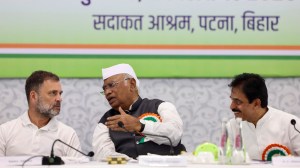Once a referee…
...And now a player? M S Gill as Minister sets an embarrassing-and disturbing precedent

M S Gill’s induction into the Union council of ministers on Sunday raises important questions, none of them to do with the portfolio he now holds. He has averred that, as minister for sports and youth affairs, he will desist from interfering in the functioning of the federations. He may well keep that promise. What is cause for worry, however, is the repercussion of his induction on the organisation he headed a decade ago: the Election Commission of India.
Constitutional authorities like the Election Commission and the Comptroller and Auditor General perform a vital oversight duty in our democracy, and it is crucial that those in charge of them stay delinked from the political process in order to avoid any suspicion of slant or bias. Without casting any aspersions on Gill, we worry about the precedent set by the UPA four years after the Congress brought him into the Rajya Sabha. As India moves from an interventionist state to a regulatory one, we have turned our faith towards a reformist judiciary, presidency and the EC. Even as confidence in the cabinet and Parliament eroded, the EC has enjoyed immense public credibility, with its constitutionally guaranteed independence and its pivotal role in our democracy. In fact, it is the public perception of the EC’s impartiality that has enhanced the legislature’s credibility.
And despite occasional controversies, the EC has performed this role exceedingly well. Even as countries like the United States grapple with electoral shenanigans and routinely worry about elections being “stolen”, the possible skews of electronic voting machines, etc, Indians have been unique in reposing their trust in the inviolability of the EC. Election commissioners have consistently displayed their independence, often butting heads with the political establishment to ensure the freedom and fairness of our elections. (For instance, former Chief Election Commissioner J.M. Lyngdoh became the target of
Gujarat Chief Minister Narendra Modi in the run-up to the 2002 state elections, but no charge of partiality stuck.)
It is in this context that we express concern about Gill’s new political avatar. How can we believe that bodies like the EC will remain fiercely independent if those in charge of them can go on to join the very fray they are meant to oversee? Because in such matters perception is paramount — it makes and marks the difference.
Photos


- 01
- 02
- 03
- 04
- 05





























